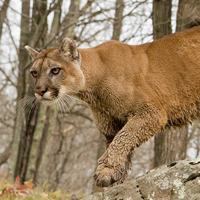Cougar
Scientific name: Puma concolor

Cover photo credit: J.D. Taylor
Status
Special concern
“Special concern” means the species lives in the wild in Ontario, is not endangered or threatened, but may become threatened or endangered due to a combination of biological characteristics and identified threats.
Date added to the Species at Risk in Ontario List
Mountain Lion or Cougar was already assessed as at risk when the Endangered Species Act, 2007 took effect in 2008. In 2022, the Committee on the Status of Species at Risk in Ontario determined that the appropriate common name for the species in Ontario is Cougar.
Read the most recent assessment report [PDF]
What it looks like
The Cougar is Canada’s largest and most powerful wildcat. Males can reach up to two metres in length and weigh over 60 kilograms. Adult Cougars have short fur that is brown or greyish (sometimes reddish) over most of the body, with a white chest and belly.
It has a long, black-tipped tail and black markings on the ears and muzzle. Kittens have spotted coats until they are about six months old.
The Cougar is a shy animal and is rarely seen by humans.
Where it lives
The Cougar lives in large, undisturbed forests or other natural areas where there is little human activity.
The forest the species resides in must support plenty of white-tailed deer, which is an important food source for the Cougar.
The Cougar has a very wide range, encompassing large areas of North, Central and South America.
Where it’s been found in Ontario
In Ontario, Cougars are believed to most likely live in northern Ontario because of the remoteness of the habitat.
However, there have been many reports from the southern part of the province.
Cougars found in Ontario may be escaped or released pets, animals dispersing from western North America, native animals or a combination of those factors. The population size is unknown.
What threatens it
The main threat to the Cougar is human disturbance and forest clearing, which destroys habitat and can reduce the prey necessary for the survival of this species. Human-caused mortality is also a threat to the species.
Action we are taking
While special concern species and their habitat do not receive protection under the Endangered Species Act, 2007 , the act requires the preparation of recovery guidance for special concern species, unless a recovery strategy or management plan is required for the species under the federal Species at Risk Act .
All species listed on the Species at Risk in Ontario List may be eligible for consideration for government funding through the Species at Risk Stewardship Program.
What you can do
Report a Sighting
Submit your observations of species at risk to the Natural Heritage Information Centre (NHIC), which is Ontario’s conservation data centre. Join the "(NHIC) Rare Species of Ontario" project in iNaturalist to make submitting your observations quick and easy.
Volunteer
Volunteer with your local nature club or provincial park to participate in surveys or stewardship work focused on species at risk.
Be a good steward
Private land owners have a very important role to play in species recovery.
You may be eligible for stewardship programs that support the protection and recovery of species at risk and their habitats.
Learn more about the Species at Risk Stewardship Program.
Report illegal activity
Report any illegal activity related to plants and wildlife to
Quick facts
- Cougars rarely chase their prey. They are masters of camouflage and will slowly and silently slink forward and then pounce. Cougars usually hunt at night.
- Cougars are shy and normally avoid humans. If you see a Cougar, stay calm, remain standing, and make yourself look large by holding your arms above your head. You should immediately back away slowly and leave the area. If the animal is aggressive, throw objects at it – never run.
- Cougars are excellent swimmers and climbers and can jump more than six metres.
- Female Cougars have two to four kittens every two to four years. The family stays close together for up to two years while the young learn how to hunt.